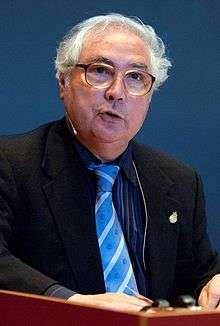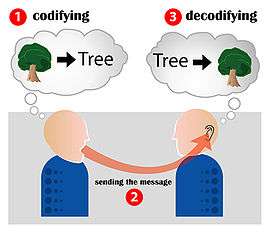Manuel Castells
| Manuel Castells | |
|---|---|
 | |
| Born |
February 9, 1942 Hellín, Albacete, Spain |
| Fields | Sociology, Urban Planning, Communication |
| Institutions | University of Cambridge; University of Southern California; Universitat Oberta de Catalunya (Open University of Catalonia); EHESS; University of Paris X: Nanterre |
| Alma mater | University of Paris |
| Doctoral students | Ananya Roy |
| Other notable students | Daniel Cohn-Bendit |
| Known for | Research on the information society, communication and globalization |
| Influences | Alain Touraine |
| Spouse | Emma Kiselyova |
|
Website www | |
Manuel Castells (Spanish: Manuel Castells Oliván, pronounced: [kaˈsteʎs]; born 1942) is a Spanish sociologist especially associated with research on the information society, communication and globalization.
The 2000–2014 research survey of the Social Sciences Citation Index ranks him as the world’s fifth most-cited social science scholar, and the foremost-cited communication scholar.[1]
He was awarded the 2012 Holberg Prize,[2] for having "shaped our understanding of the political dynamics of urban and global economies in the network society."[3] In 2013 he was awarded the Balzan Prize for Sociology.
Life
Manuel Castells was raised primarily in La Mancha but he moved to Barcelona, where he studied Law and Economics. Although from a conservative family, Castells says:
"My parents were very good parents. It was a conservative family — very strongly conservative family. But I would say that the main thing that shaped my character besides my parents was the fact that I grew up in fascist Spain. It's difficult for people of the younger generation to realize what that means, even for the Spanish younger generation. You had actually to resist the whole environment, and to be yourself, you had to fight and to politicize yourself from the age of fifteen or sixteen".[4]
Castells was politically active in the student anti-Franco movement, an adolescent political activism that forced him to flee Spain for France. In Paris, at the age of 20, he completed his degree studies, then progressed to the University of Paris, where he earned a doctorate in sociology. At the age of twenty-four, Castells became an instructor in several parisian universities from 1967 to 1979; first at the Paris X University Nanterre (where he taught Daniel Cohn-Bendit), which fired him because of the 1968 student protests, then at the École des Hautes Études en Sciences Sociales, from 1970 to 1979.
In 1979, the University of California, Berkeley appointed him as Professor of Sociology, and Professor of City and Regional Planning. In 2001, he was a research professor at the UOC-Universitat Oberta de Catalunya (Open University of Catalonia), Barcelona. In 2003, he joined the University of Southern California (USC) Annenberg School for Communication, as a Professor of Communication and the first Wallis Annenberg-endowed Chair of Communication and Technology.[5] Castells is a founding member of the USC Center on Public Diplomacy, and a senior member of the diplomacy center's Faculty Advisory Council; and is a member of the Annenberg Research Network on International Communication. Castells divides his residence between Spain and the US; he is married to Kiselyova. Since 2008 he has been a member of the governing board of the European Institute of Innovation and Technology.
Work
The sociological work of Manuel Castells synthesises empirical research literature with combinations of urban sociology, organization studies, internet studies, social movements, sociology of culture, and political economy. About the origins of the network society, he posits that changes to the network form of enterprise predate the electronic internet technologies (usually) associated with network organization forms (cf. Organization theory (Castells)). Moreover, he coined the (academic) term “The Fourth World”, denoting the sub-population(s) socially excluded from the global society; usual usage denotes the nomadic, pastoral, and hunter-gatherer ways of life beyond the contemporary industrial society norm.
Castells maintains that the Information Age can "unleash the power of the mind,"[6] which would dramatically increase the productivity of individuals and lead to greater leisure, allowing individuals to achieve "greater spiritual depth and more environmental consciousness."[6] Such change would be positive, he argues, in that it would cause resource consumption to decrease. The Information Age, The Age of Consumption, and The Network Society are all perspectives attempting to describing modern life as known in the present and to depict the future of society. As Castells suggests, contemporary society may be described as “replacing the antiquated metaphor of the machine with that of the network.”
In the 1970s, following the path of Alain Touraine (his intellectual father),[7] Castells was a key developer of the variety of Marxist urban sociology that emphasises the role of social movements in the conflictive transformation of the city (cf. post-industrial society).[8] He introduced the concept of "collective consumption" (public transport, public housing, etc.) comprehending a wide range of social struggles — displaced from the economic stratum to the political stratum via state intervention. Transcending Marxist structures in the early 1980s, he concentrated upon the role of new technologies in the restructuring of an economy. In 1989, he introduced the concept of the "space of flows", the material and immaterial components of global information networks used for the real-time, long-distance co-ordination of the economy. In the 1990s, he combined his two research strands in The Information Age: Economy, Society and Culture, published as a trilogy, The Rise of the Network Society (1996), The Power of Identity (1997), and End of Millennium (1998); two years later, its worldwide, favourable critical acceptance in university seminars, prompted publication of a second (2000) edition that is 40 per cent different from the first (1996) edition.[9]
The Information Age: Economy, Society and Culture comprehends three sociological dimensions — production, power, and experience — stressing that the organisation of the economy, of the state and its institutions, and the ways that people create meaning in their lives through collective action, are irreducible sources of social dynamics — that must be understood as both discrete and inter-related entities. Moreover, he became an established cybernetic culture theoretician with his Internet development analysis stressing the roles of the state (military and academic), social movements (computer hackers and social activists), and business, in shaping the economic infrastructure according to their (conflicting) interests. The Information Age trilogy is his précis: "Our societies are increasingly structured around the bipolar opposition of the Net and the Self";[10] the “Net” denotes the network organisations replacing vertically integrated hierarchies as the dominant form of social organization, the Self denotes the practices a person uses in reaffirming social identity and meaning in a continually changing cultural landscape.
Publications
Manuel Castells is one of the world's most often-cited social science and communications scholars.[11][12] He has written more than twenty books, including:
- The Urban Question. A Marxist Approach (Alan Sheridan, translator). London, Edward Arnold (1977) (Original publication in French, 1972)
- City, Class and Power. London; New York, MacMillan; St. Martins Press (1978)
- The Economic Crisis and American Society. Princeton, NJ, Princeton UP (1980)
- The City and the Grassroots: A Cross-cultural Theory of Urban Social Movements. Berkeley: University of California Press (1983)
- The Informational City: Information Technology, Economic Restructuring, and the Urban Regional Process. Oxford, UK; Cambridge, MA: Blackwell (1989)
- Technopoles of the World : The Making of 21st Century Industrial Complexes. London, New York: Routledge (1994)
- The Information Age trilogy:
- Castells, Manuel (1996). The Rise of the Network Society, The Information Age: Economy, Society and Culture Vol. I. Cambridge, MA; Oxford, UK: Blackwell. ISBN 978-0-631-22140-1.
- Castells, Manuel (1997). The Power of Identity, The Information Age: Economy, Society and Culture Vol. II. Cambridge, MA; Oxford, UK: Blackwell. ISBN 978-1-4051-0713-6.
- Castells, Manuel (1998). End of Millennium, The Information Age: Economy, Society and Culture Vol. III. Cambridge, MA; Oxford, UK: Blackwell. ISBN 978-0-631-22139-5.
- The Internet Galaxy, Reflections on the Internet, Business and Society. Oxford, Oxford University Press (2001)
- The Information Society and the Welfare State: The Finnish Model. Oxford UP, Oxford (2002) (co-author, Pekka Himanen )
- The Network Society: A Cross-Cultural Perspective. Cheltenham, UK; Northampton, MA, Edward Elgar (2004), (editor and co-author), ISBN 978-1-84542-435-0.
- The Network Society: From Knowledge to Policy. Washington, DC, Center for Transatlantic Relations (2006) (co-editor)
- Mobile Communication and Society: A Global Perspective. Cambridge, MA, MIT Press (2006) (co-author)
- Communication power. Oxford/New York, Oxford University Press (2009) ISBN 978-0-19-956704-1
- Aftermath: the cultures of the economic crisis. Oxford, UK: Oxford University Press (2012) ISBN 978-0-19-965841-1
- Networks of Outrage and Hope. Social Movements in the Internet Age. Cambridge, MA, Polity Press (2012) ISBN 978-0-74-566284-8
Recent Journal Articles
- Arsenault, A & Castells, M. (2008) Switching power: Rupert Murdoch and the global business of media politics: A sociological analysis. International Sociology 23(4): 488.
- Arsenault, A, and Castells, M. 2008. The structure and dynamics of global multimedia business networks. International Journal of Communication 2707-48.
- Castells, M (2007) Communication, power and counter-power in the network society. International Journal of Communication 1(1): 238-66.
Pertinent papers
- Social Uses of Wireless Communications: The Mobile Information Society, co-author of the paper for the International Workshop on Wireless Communication Policies and Prospects: A Global Perspective, USC, 8–9 October 2004.
Books about Manuel Castells
- Susser, Ida. The Castells Reader on Cities and Social Theory. Oxford, Blackwell (2002)
- Castells, Manuel; Ince, Martin. Conversations with Manuel Castells. Oxford, Polity Press (2003)
- Stalder, Felix. Manuel Castells and the Theory of the Network Society. Oxford, Polity Press (2006)
- Howard, Phillip: Castells and the Media. Cambridge, Polity Press (2011)
References
- ↑ "Relative Ranking of a Selected Pool of Leading Scholars in the Social Sciences by Number of Citations in the Social Science Citation Index, 2000-2014." (PDF). Retrieved 2015-09-18.
- ↑ "Manuel Castells mottok Holbergprisen for 2012". Regjeringen.no.
- ↑ "Manuel Castells". holbergprisen.no.
- ↑ Harry Kreisler, Manuel Castells, Conversations with History: Manuel Castells (video interview, 9 May 2001), Berkeley, CA: University of California Television (UCTV), 2001, 1min26sec.
- ↑ "Endowed Faculty Chairs". USC Annenberg.
- 1 2 Strangelove, Michael (2005). The Empire of Mind: Digital Piracy and the anti-capitalist movement. Toronto, On, Canada: University of Toronto Press. p. 8.
- ↑ Castells and Ince 2003, pp. 11–12
- ↑ Castells and Ince 2003, p. 12
- ↑ Castells and Ince 2003, p. 20
- ↑ Castells, The Rise of the Network Society (1996) p. 3
- ↑ Citations in the Social Science Citation Index, 2000-2007
- ↑ Citations in the Social Science Citation Index, 2000-2007 (living scholars only)
External links
| Wikiquote has quotations related to: Manuel Castells |
- Webpage of Castells at USC Annenberg
- Webpage of Castells at UC Berkeley (Professor Emeritus listing)
- Website devoted to his work, made by Open University of Catalonia
- Video stream of an hour long interview with Castells, conducted in 2001
- Conference on his actual researches on massive social movements involved in the Arab Springs and the Occupy Movements.
- International Journal of Communication Academic journal co-founded by Castells, established in 2007
- Manuel Castells' World of Communication, a Manuel Castells exclusive monthly article in Media Coolhunting.
- Audio: Manuel Castells in conversation on the BBC World Service discussion programme The Forum
- Video Stream: Manuel Castells October 2009 keynote at University of Oxford Internet Institute for the release of his new book, "Communication Power"
- Video Stream: Manuel Castells March 2010 at USC Annenberg, International Seminar on Network Theory on YouTube
